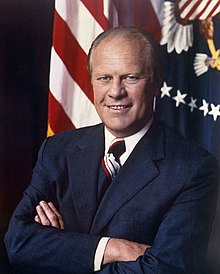William Denman Eberle
William Denman Eberle (born June 5, 1923 in Boise , Idaho , † April 3, 2008 in Concord , Massachusetts ) was an American economic manager , politician of the Republican Party and trade representative of the United States during the tenure of US President Richard Nixon .
Life
Degree, politician and business manager
After attending school, Eberle began studying at Stanford University in 1941 , but interrupted it in 1943 to complete his military service in the US Navy after training as an officer during the Second World War .
After World War II, he continued his studies at Stanford University and then completed postgraduate studies in economics and law at Harvard University . After graduating, he returned to Boise, the town of his birth, in 1950, where he established himself as a lawyer .
Shortly thereafter, he began a career as a politician in the Republican Party and won the 1953 election to the Idaho House of Representatives . In 1957 he was first Majority Leader before he was Speaker of the House of Representatives in his last year in office in 1961.
Also in 1957, Eberle helped Robert V. Hansberger, a fellow student at Harvard University, in the merger of companies that led to the creation of the pulp and paper company Boise Cascade . After he left the Idaho House of Representatives in 1961, he became a full-time manager at Boise Cascade and was most recently vice president of the company from 1959 to 1966. In 1966 he joined as president to the conglomerate American Standard Companies , where he in 1967 to Chief Executive Officer and finally (CEO) 1971 CEO rose.
In addition, he was from 1969 to 1974 member of the Advisory Board of the Faculty of Economics at Stanford University ( Stanford Business School ).
US sales agent and return to the private sector
Eberle was appointed United States sales representative with the rank of ambassador in November 1971 by US President Richard Nixon .
His appointment came at a time when the US economy suffered setbacks due to inflation , recession and the Vietnam War . The post-war policies that encouraged economic rebuilding in Europe and Japan also contributed to growing global economic competition and thus competition for US companies, which were additionally affected by fixed exchange rates that artificially created the US dollar held high.
Eberle tirelessly, albeit with limited success, urged trading partners to give US farmers and businesses more access to overseas markets that were protected by tariffs , bilateral agreements between Europe and former colonies, and other barriers. He contributed to a depreciation in the US dollar, which led to that American exports by price here were competitive. On the other hand, he had to fight against isolationist voices in his home country and at the same time worked on the representation of foreign perspectives for the US economy.
Most recently, he was cabinet director for international economic policy between 1973 and 1974 and as such an active supporter of the Tokyo Round of the General Agreement on Tariffs and Trade (GATT), which began in 1974 .
In December 1974, he stepped down as a US commercial agent, four months after President Nixon had to resign over the Watergate affair .
After he left the US federal government , he became president of the Automobile Manufacturers Association, a trading company of the US automotive industry that existed between 1911 and 1999 . Subsequently, Eberle was President of the US Council of the International Chamber of Commerce in Paris and Chairman of its commission for trade-related affairs, before he finally focused his economic activities as a management consultant .
Between 1986 and 1994 he was also Chairman of the US-Japan Foundation. The William D. Eberle Professorship for International Economics at Stanford University is also named in his honor.
Web links
- NEW YORK TIMES: William D. Eberle, Trade Representative for Nixon, Is Dead at 84 (April 9, 2008)
- Obituary (Concord Funeral Home)
| personal data | |
|---|---|
| SURNAME | Eberle, William Denman |
| BRIEF DESCRIPTION | American politician and manager |
| DATE OF BIRTH | June 5, 1923 |
| PLACE OF BIRTH | Boise , Idaho |
| DATE OF DEATH | April 3, 2008 |
| Place of death | Concord , Massachusetts |

